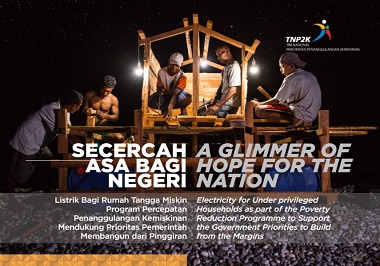A Glimmer of Hope for the Nation
The Indonesian Government continues to strive to provide basic infrastructure, including electricity infrastructure, for Indonesians–particularly for the poor. As basic infrastructure, electricity is needed to support various activities, both economically and socially. For the poor, having access to electricity has proven to increase productivity–one of the requirements for poor families to escape from poverty.
Although the government continues its efforts to increase electrification and has shown great progress, one cannot deny that there are still a lot of people, particularly the poor and vulnerable, who do not yet have access to electricity. Some regions are still off grid and not connected to the PLN electricity network. To address this condition, the Secretariat of the National Team for the Acceleration of Poverty Reduction (TNP2K) facilitates, develops and implements partnership programs between the government, the private sector and communities to provide access to electricity to meet the basic needs of the poor in those off-grid areas. This partnership program is part of a government, private sector and community Partnership Framework developed by TNP2K to reduce poverty.
This electricity for the poor program has been implemented in South Central Timor District, East Nusa Tenggara Province, Central Maluku District and Western Seram District, Maluku Province. This program aims to provide a basic electricity facility through Solar Home System (SHS) installations for the poor as well as street lighting in rural areas that are beyond the reach of the PLN electric grid.
This partnership to provide basic electricity needs for the poor is not only limited to provision of SHS, but also through development of social infrastructure to prepare and empower communities to be able to utilize, manage and maintain the sustainability of equipment provided. The active role of local governments is also encouraged to prepare relevant regulations, allocate the budget, mobilize local government personnel for verification and education, as well as monitoring and evaluation processes. Local governments participating in this partnership program are encouraged to develop the capacity to continue this partnership program in the future.
This program was commenced in 2017 and has shown encouraging results. There is evidence that the productivity of beneficiary households has improved, social cohesion has strengthened, and the quality of education for school-aged children has been improved as they have more time to study. We hope that this cooperation between TNP2K and local government and private sector partners can serve as a model to be replicated in other regions, and even scaled up.
